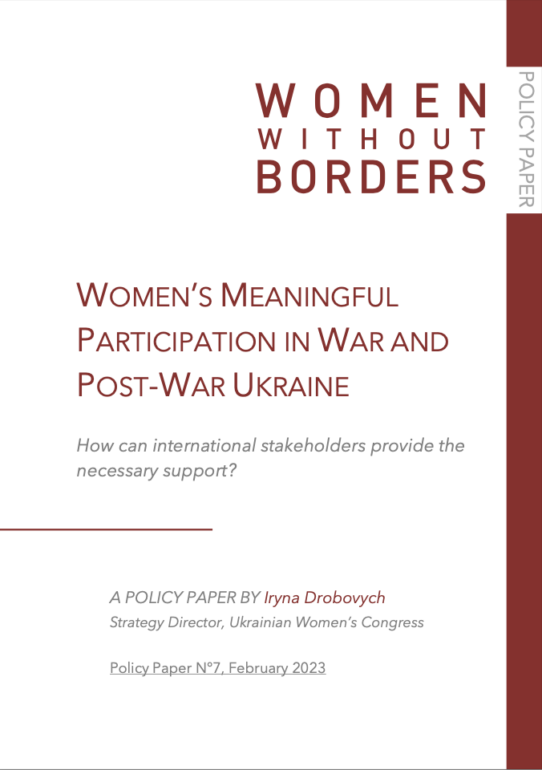‘Mothers MOVE’ served as a factfinding mission to probe the potential of bringing Women without Borders’ (WwB) ‘MotherSchools: Parenting for Peace’ Model to Indian and Pakistani communities across Kashmir. Against this background, the research set out to identify and contextualise how mothers on both sides could be positioned to prevent the spread of violent extremism in their families and communities. WwB thus conducted one hundred in-depth interviews with affected mothers from divergent ethnic, religious, and socio-economic backgrounds. Based on the research findings and in an effort to address the mothers’ perceived shortcomings, WwB has implemented various contextualised iterations of its MotherSchools on both sides, training two hundred Kashmiri mothers across nine groups to date.
Since the partition of India and Pakistan, Kashmir has become one of the most highly militarised regions in the world. With India and Pakistan both laying claim to the territory, the countries have since 1947 fought three wars. Renewed tensions among political, religious, and ethnic lines have over recent years led to a spike in radicalisation among the new generation in particular. Kashmir first became a hotbed of violent extremism towards the end of the Soviet-Afghan War, when the Mujahedeen from Afghanistan infiltrated Kashmir’s borders and provided arms and training to both native and foreign militants. The issue has evolved, and Islamist cells have succeeded in strengthening their presence and stepping up their recruitment efforts on the ground. In 2004 alone, some 284 terrorist incidents were recorded. Diplomatic ties between India and Pakistan—in which Kashmir acts as a major sticking point—were severed almost entirely in the wake of the 26/11 Mumbai attacks in 2008. While negotiations have resumed, daily life in Kashmir continues to be strained by enduring tensions.
Upon discovering that Kashmiri women were most affected by the conflict, Women without Borders (WwB) launched its ‘Mothers MOVE! Mothers Opposing Violent Extremism in Kashmir’ project in July 2013 to record their stories, and to learn about the support mechanisms that they deemed necessary for the development of effective soft-power-oriented female security strategies. From previous projects in related fields and the implementation of its ongoing ‘MotherSchools: Parenting for Peace’ Model, WwB learned that mothers often are the forgotten victims of violent conflicts, particularly when their husbands and sons take up arms, go to jail, or are killed. Yet while they also remain at the heart of society and by and large communicate a preference for non-violent solutions, few have tapped into their peacebuilding and safeguarding potential.
‘Mothers MOVE’ served as a factfinding mission to probe the potential of expanding WwB’s MotherSchools to Kashmir. Against this background, the research sought to identify and contextualise how mothers across the region could be positioned to prevent the spread of violent extremism in their families and communities. WwB thus conducted one hundred in-depth interviews with affected Indian and Pakistani mothers from divergent ethnic, religious, and socio-economic backgrounds. On the Indian side, WwB partnered with Archana Kapoor, chairperson at SMART. For Pakistan, WwB worked with Arshi Saleem Hashmi, associate professor and researcher at Islamabad’s Defence University. Each mobilised fifty participants and facilitated travel in Kashmir. In Azad Kashmir, Hashmi conducted interviews in the city of Muzaffarabad, the capital city of the Pakistani-controlled sector. In Jammu and Kashmir on the Indian side, Edit Schlaffer, Archana Kapoor, and Ulrich Kropiunigg conducted interviews in Shilvat, Srinagar, Chardoora, Sopore, and Kupwara.
The interviews revealed that mothers from both sides held strikingly similar views and grievances. Regardless of ethnic, religious, and socio-economic background, fear and anxiety proved to be the most prevalent feelings. While all of them expressed a desire to identify and pursue peaceful alternatives, many found themselves caught between the frontlines: ‘fear of the insurgents and also from the military’, as one mother noted, made her feel ‘trapped in the middle’. The most illuminating findings related to the study’s ‘conceptions of motherhood’ section.
In line with previous MotherSchools-related research, the interviews reinforced that conceptions of honour and shame in patriarchal and vulnerable communities have a dampening effect on women’s awareness of and confidence in their own abilities as peacebuilders. ‘Here in my village’, a mother explained, ‘they will just talk if you tell them your problems, so I think it’s better to be quiet and not to share anything. Here in our area, the doors have ears, so we stopped all conversations which are related to the political or the conflict even at home’. The research revealed a level of frustration with how taboos and this culture of distrust within communities came at the expense of support for women. Some of the interviewees saw building trust among like-minded women as a possible solution (‘If women in my area can sit and discuss, we can solve many problems by sharing’).
While very few of the participants could conceptualise a world in which they would play a role in combating violent extremism, they viewed ‘motherhood’ as the key defining feature of their identity. The participants were in agreement that they had a responsibility to raise and safeguard their children. In spite of this, the interviewees expressed a degree of paralysis in fulfilling their ‘duty’ to protect their children; most felt that they lacked the necessary skills, knowledge, and social standing to play a role in this sphere. Based on the research findings and in an effort to address the mothers’ perceived shortcomings, WwB has implemented various contextualised iterations of its MotherSchools on both sides, training two hundred Kashmiri mothers across nine groups to date.


